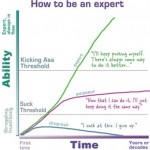In re-reading Dave Pollard’s post on personal knowledge management (PKM) I noticed some parallels with the field of online learning. Dave states that:
And although technology companies, by coopting the term Knowledge Management and making it synonymous with centralized content management, have played a role in tarnishing KM’s image, some technology companies are now developing simple, intuitive tools that will make each of the four components of PKM easier to implement.
I think that technology firms did the same with e-learning. They coopted the term to mean structured and managed courses online.
Dave’s experience showed that people were more interested in their own knowledge than in the organisation’s knowledge.
So my conclusion this time around was that the centralized stuff we spent so much time and money maintaining was simply not very useful to most practitioners. The practitioners I talked to about PPI [Personal Productivity Improvement] said they would love to participate in PPI coaching, provided it was focused on the content on their own desktops and hard drives, and not the stuff in the central repositories.
E-learning, for many, has come to mean courses online, delivered via learning management systems. One problem with this model is that learners (the key participants) don’t care about how learning is managed. Another problem is that the course and class models don’t work very well online.
I think that face-to-face classes have worked fairly well historically because good teachers and students could always make up for the inherently poor design. Looks could be passed between students, conversations could take place between class, and trusting relationships could develop over time together in the classroom. However, in an online environment the design flaws stand out, because people can’t easily communicate outside the course-in-a-box.
As the horseless carriage was the outdated metaphor for the automobile, so the course is the outdated metaphor for learning online.
The Internet is the most powerful communication environment that humans have ever built. The Internet is about communication, not content. Therefore, learning online needs to focus on communicating and connecting. If it doesn’t, it will be irrelevant to those who actually live and work online.
Small pieces, loosely joined in an informal and unstructured way, is a better model for online learning. It leverages the inherent nature of the medium. Virtual classrooms and online courses constrain communication and learner control. We need to build better models and methods to create personally meaningful online learning. Using the lens of informal learning is a start.


Of course, I agree. In fact, I’ve added a link to your post from the Unworkshop wiki. People who miss the point of PKM do themselves a great disservice.
Harold, great post and I’ve been intrigued by the synergies/cross-overs between PKM, personal learning, informal learning and eLearning. I have a strong belief right now that we are all struggling with our own Personal Productivity Improvement – especially with the rapidly changing landscape for Personal Learning. So, I wonder how well we can realistically help others with PKM, personal learning, etc. More thoughts at:
eLearning Technology: Personal Learning for Learning Professionals – Using Web 2.0 Tools to Make Reading & Research More Effective